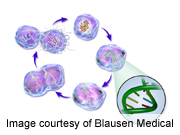
MONDAY, June 4 (HealthDay News) — There’s more encouraging news from the brave new world of “personalized” cancer care, with three drugs showing promise against some of the most common cancers.
Two studies to be presented Monday at the American Society of Clinical Oncology (ASCO) annual meeting in Chicago focus on drugs that treated advanced melanoma, while a third study looks at a gene-targeted chemotherapy for a subset of lung cancers.
All of the drugs seemed effective in these phase 3 trials.
Already, targeted medications such as these “are of use in the metastasis [cancer] setting,” said ASCO spokeswoman Dr. Sylvia Adams, who moderated a press briefing Sunday on the new trials.
“In advanced lung cancer, advanced melanoma, [targeted therapies] are the standard of care,” said Adams, an assistant professor in the department of medicine at NYU’s Langone Medical Center in New York City.
In the past, doctors gave cancer drugs to patients generally, in the hopes that at least some of the patients would respond. Nowadays, personalized medicine is “a more patient-focused approach that targets treatments to the genetic abnormality in cancers that drive cancer growth,” Adams explained.
The idea is that if a patient’s tumor tests positive for a certain cancer-linked genetic mutation, then a drug targeting that aberration should help. On the other hand, if the patient’s cancer does not carry that gene flaw, he or she can be spared trying out the medication.
One trial reported on at the ASCO meeting on Monday included 322 patients with a form of advanced melanoma that involves so-called BRAF mutations.
The patients — who had already received at least one round of chemotherapy — were randomly assigned to receive standard chemotherapy (either dacarbazine or paclitaxel) or an experimental drug called trametinib.
Trametinib targets a particular point in the same cell-signaling pathway that includes BRAF, so it was hoped that the drug would short-circuit this pathway and help slow tumor growth.
According to study co-author Dr. Caroline Robert, a professor of dermatology at Institut Gustave Roussy in France, the drug did seem to work for many of these tough-to treat patients.
At the press briefing, she said there was a “very significant difference” in outcomes for patients on trametinib compared to those on standard therapy. For example, median survival without tumor progression was pegged at 4.8 months for those on the experimental drug, versus 1.5 months for those on standard chemo. Patients on the newer drug also had a 46 percent reduced risk for death compared to those on the standard regimen, Robert said.
That survival advantage might even be higher, Robert noted, since so many patients on standard therapy opted to “cross over” midway through the trial to get trametinib instead.
This study, funded by drug maker GlaxoSmithKline, was also published simultaneously June 4 in the New England Journal of Medicine.
In a second phase 3 melanoma trial presented at the ASCO meeting, 345 patients with untreated, inoperable late-stage melanomas were randomly assigned to either the experimental, BRAF-targeted drug dabrafenib or the standard chemotherapy, dacarbazine.
Survival without tumor progression averaged more than five months for those on the new drug, compared to 2.7 months for people on the older therapy. Half of patients on dabrafenib responded to treatment, compared to just 6 percent of those on standard chemo, the researchers reported.
Side effects did occur but were seldom serious and only 3 percent of patients discontinued their use of dabrafenib, according to study author Dr. Axel Hauschild, a professor of dermatology at University Hospital in Kiel, Germany.
Speaking at the news briefing, Hauschild said that “the next step is [trying] a combination of dabrafenib and trametinib” for patients with these BRAF-sensitive melanomas.
Finally, a third study looked at another gene-targeted compound against non-small cell lung cancers, the most common form of the disease. The drug, afatinib, inhibits two types of gene aberrations in the epidermal growth factor receptor [EGFR], a key focus of current lung cancer research.
A total of 345 patients with advanced, EGFR-sensitive lung cancers were given either afatinib or standard chemotherapy. Those on the new drug saw a significant jump in terms of survival without disease progression — an average of 11 months, versus just under seven months for those on standard chemo. And for the subset of 308 patients with the most common EGFR mutations, progression-free survival nearly doubled, to 13.6 months.
Lung cancer symptoms such as cough and shortness of breath also declined in people on the new drug. Overall, patients on afatinib “had better quality of life and better symptom control than with [standard] chemotherapy,” study author Dr. James Chih-Hsin Yang, of National Taiwan University Hospital, said at the press briefing.
According to ASCO spokeswoman Adams, these studies “promise to expand the range of effective and targeted therapies for patients with common cancers.”
Findings presented at medical meetings are typically considered preliminary unless (as with the trametinib trial) they are also published in a peer-reviewed journal.
More information
Find out more about gene-targeted therapies at the U.S. National Cancer Institute.

